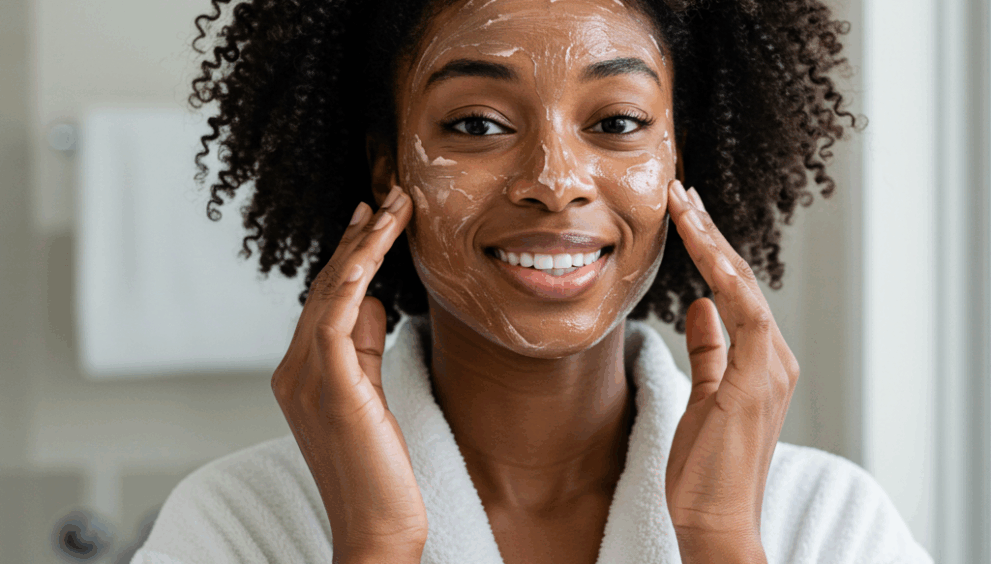“ Diversity matters in skincare because there is power in representation ”
Genasha Naidoo
Skincare is undergoing a profound transformation as brands, researchers, and consumers alike recognize that beauty innovation must cater to every hue and texture. This shift goes beyond marketing buzzwords, demanding
changes in formulation, testing and cultural dialogue to ensure that every individual sees their needs reflected in the beauty aisle.
For decades, the global skincare industry prioritized lighter skin types in both research and product development, leaving melanin-rich individuals with limited options and little guidance. A striking illustration of this oversight comes from the Journal of the American Academy of Dermatology, which found that only four percent of dermatology trials focused on conditions more prevalent among people of color, such as hyperpigmentation and keloid scarring.
This glaring gap has meant that brands often lack robust data on how ingredients interact with deeply pigmented skin, leading to formulations that may under-deliver or even exacerbate underlying concerns.
Scientific understanding of melanin’s role in skin health has brought hyperpigmentation into sharper focus. Research cited by Versed Skin indicates that 60 to 80 percent of individuals with higher melanin levels in the United States experience some form of pigmentation disorder following acne breakouts.
These dark spots and uneven patches not only present aesthetic challenges but can carry emotional weight, affecting self-esteem and quality of life. Recognizing this, innovative brands are now isolating actives such as niacinamide, tranexamic acid and botanical extracts with proven efficacy against melanin overproduction, while prioritizing gentle delivery systems that prevent irritation.
Market forces are also realigning priorities. Despite representing 11.1 percent of the total beauty-spending segment in the United States, Black consumers historically saw little return on their investments in mainstream products.
Today, their purchasing power and vocal presence on social media platforms are propelling brands to co-develop lines with dermatologists of color and tap community insights into fragrance, texture and shade ranges.
Collaborative efforts between indie labels and established manufacturers have yielded targeted serums, tinted sunscreens and barrier-repair masks formulated specifically for deeply pigmented skin, signaling a new era where inclusivity drives innovation rather than rhetorical commitments.
Regulatory bodies and research institutions are beginning to respond to consumer and advocacy pressure by mandating diverse representation in clinical studies. Forward-thinking companies now recruit volunteers across a broad spectrum of skin prototypes to assess safety, tolerability and real-world performance. These initiatives not only build confidence but also generate richer datasets that inform future breakthroughs.
Experts predict that by weaving inclusivity into foundational research, the industry will accelerate the discovery of novel actives and fine-tune delivery vehicles suited to all skin architectures. At the grassroots level, empowered consumers are reshaping the beauty dialogue.
Digital skin-tone matching tools, user-generated reviews and online communities dedicated to melanin-rich skincare experiences have surfaced unmet needs and broken down traditional gatekeeping.
Brands that embrace transparency—publishing formulation rationales, ingredient sourcing and third-party clinical outcomes—are earning lasting loyalty. Meanwhile, beauty retailers in major markets are revamping shade-find systems to accommodate a wider chromatic gamut, ensuring that samples and in-store consultations reflect real diversity.
Looking forward, inclusive innovation in skincare promises to bridge the divide between scientific potential and personal relevance. Emerging technologies such as artificial-intelligence-driven ingredient screening and at-home diagnostic devices will further personalize treatments, adapting recommendations not only to skin tone but to lifestyle, environment and genetic predispositions. As research models evolve and cultural conversations deepen, the once-hidden spectrum of skin types will command center stage in beauty labs worldwide.
Skincare’s inclusive revolution is more than a trend; it is a fundamental realignment of priorities that honors every individual’s right to feel seen and supported. By embedding diverse voices into every step—from research design and product formulation to marketing narratives and post-launch feedback—brands can finally deliver on the promise of truly universal beauty. In this era of informed consumers and agile innovation, embracing every skin tone is both an ethical imperative and a pathway to richer scientific discovery that benefits us all.
Source: Ghana to post fastest growth in personal care spending – Fitch Solutions – Ghanaian Times




